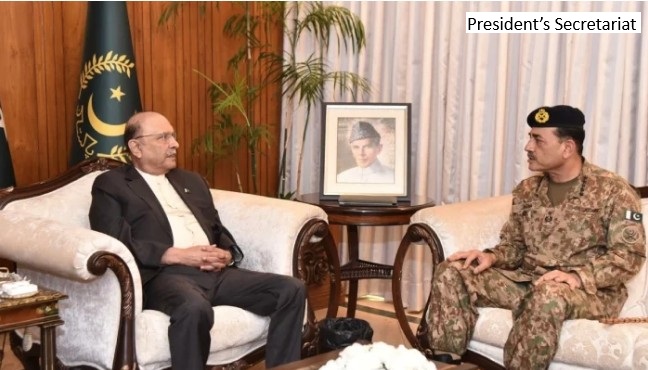Laiq Khan

Islamabad: Chief of Army Staff (COAS) Field Marshal Asim Munir called on President Asif Ali Zardari at Aiwan-e-Sadr on Wednesday and briefed him on the prevailing internal and external security situation, particularly the escalating border tensions with Afghanistan.
According to the President’s Secretariat, Field Marshal Munir informed the president about the “aggressive and provocative actions” of the Afghan Taliban regime along Pakistan’s western frontier and the befitting response by the country’s armed forces.
“He apprised the president of the recent security situation arising from the aggressive and provocative actions of the Afghan Taliban regime, as well as the measured and befitting response by the Armed Forces of Pakistan,” the statement said.
President Zardari reaffirmed that Pakistan will defend its sovereignty and territorial integrity at all costs, expressing full confidence in the “strength, valour, and preparedness” of the military. He lauded the armed forces for their “vigilance and professionalism” in swiftly repelling recent cross-border attacks.
The meeting took place hours after Pakistan’s security forces repelled another Taliban assault along the Balochistan border, killing 15 to 20 fighters and destroying eight Afghan posts, including six tanks, according to the Inter-Services Public Relations (ISPR).
The ISPR said today’s exchange marked the third major skirmish between Pakistan and Afghanistan within a week, following similar clashes in Kurram on Tuesday and in multiple locations from Saturday night through Sunday morning.
In the earlier engagements, 23 Pakistani soldiers were martyred and 29 others injured, while intelligence estimates indicated that over 200 Taliban and affiliated militants were neutralised in Pakistan’s retaliatory strikes.
The Afghan Taliban claimed their attack was a “retaliatory measure”, accusing Islamabad of conducting air strikes inside Afghanistan last week. Pakistan has not confirmed such strikes but reiterated its right to self-defence against cross-border terrorism.
The ongoing escalation has drawn regional concern, with Saudi Arabia, Qatar, Iran, and Russia among countries urging restraint and dialogue.
The clashes have further strained already tense ties between Islamabad and Kabul, as Pakistan continues to urge the Taliban regime to prevent terrorist groups from using Afghan soil for attacks — a demand Kabul continues to deny.























